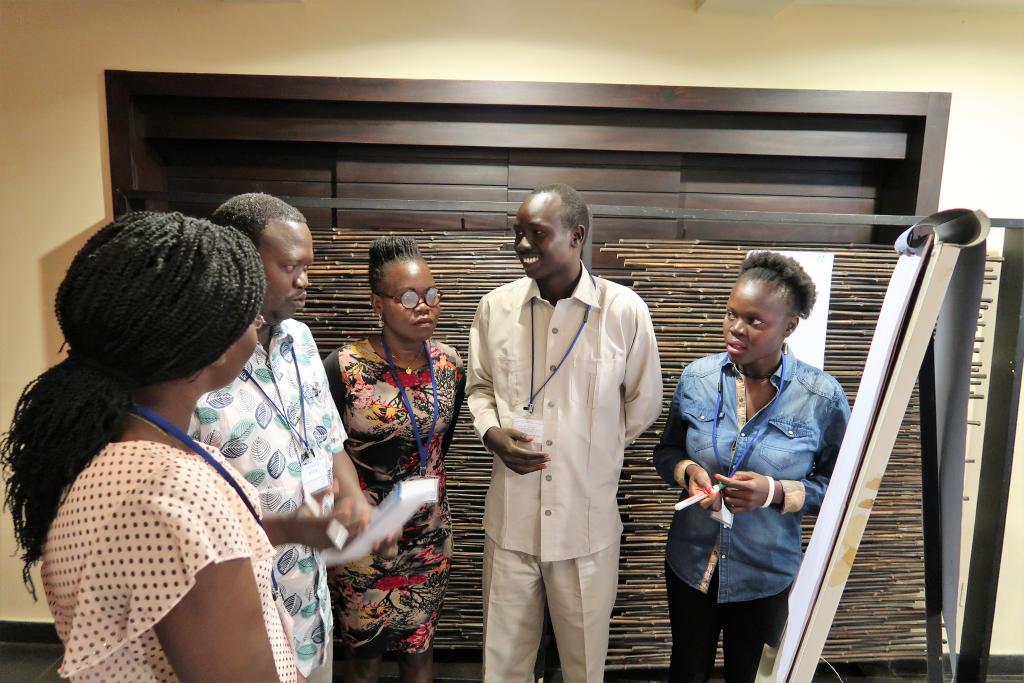Twenty Fellows Receive Training on Needs Assessment and Leadership in Entebbe, Uganda


11 July 2018 – Hiroshima, Japan - The United Nations Institute for Training and Research (UNITAR), Hiroshima Office in financial and institutional support of the Japanese and South Sudanese governments concluded Workshop II for the UNITAR Hiroshima South Sudan Fellowship on Entrepreneurship and Project Planning on 26 June 2018 in Entebbe, Uganda. Twenty Fellows, supported by five Coaches and two UNITAR Staff participated in the workshop.
The workshop served as the second face-to-face event for Fellows to continue working on their needs assessments. Fellows reviewed needs assessments, which they will complete as Assignment One of the 6-month long programme and will follow up with their project proposals through further training during Workshop III to be held in Hiroshima, Japan, later this year where the focus will shift to project development and implementation planning. The workshop focused on assessment practices to assist Fellows in determining the needs of the community where they plan to implement their project as well as communication and planning skills to assist fellows in gathering, analysing and reporting on the data. Additionally, the workshop touched on concepts like design thinking to encourage creativity and solution-based approaches.
In teaching the practice of taking a needs assessment, the workshop aims to enable Fellows to solve challenges and take advantage of opportunities in their own communities. As one Fellow, Bulis Nguali Def of Help Restore Youth, stated, “I am very glad to attend this training because as an organization we applied for funding many times but most of the proposal[s] yield no feedbacks and we did not know the reasons why. From the knowledge I gained in this workshop today, I realized that the reason is because there were no proper planning and proper Organizational Needs Assessments (ONA) carried out”.
Coaches selected to assist in facilitating the workshop understood the experience well, as former Fellows from the previous cycles of the programme. The coaches helped give context to the workshop, explaining challenges in the context of South Sudan. Participant, Ms. Rita Chol, working with the South Sudan Ministry of Foreign Affairs and International Cooperation felt the positive role the coaches had, saying, “due to [the coaches] experiences and involvement [I]... got confidence since they had the same fears I had before”. Additionally, UNITAR offered Training of Trainer sessions to build the capacity of coaches themselves.
Innovative practices like, design thinking, help build the capacity of participants, giving them the skills to plan their own projects. Mr. Aliandro Lotok Paul, with South Sudan Broadcasting Corporation (SSBC), Ministry of Information, learned that “Design Thinking is a strategy that provides a solution-based approach to solving problems. I have learnt to listen to the feelings and motivations of other people. I can now confidently say, that I have learnt how to incorporates the views of other in whatever plan, initiative or program that I want to undertake. I can now examine the experience of others and tell them what the experience could impact their actions.” Design thinking helped build communication skills as well, since “Through the training, I have learnt the art of interaction with others and being able to listen to each other and make use of their suggestions or opinions in solving a problem,” Mr. Paul said.
Communication, a primary part of the workshop, assisted fellows in working with groups, presenting their ideas to prospective donors, and improving their public speaking skills. Ms. Santa Jima Justin Ali, a participant from the College of Law at the University of Juba, commented on communication learned during the workshop stating, “effective communication with your partner is essential to your work. Effective communication is the process of sharing information, thoughts and feelings among or between people through writing, listening, speaking and body language.”
The programme focuses on addressing gender equity, and the current group of Fellows consists of 10 males and 10 females. One of the participants, Ms. Margaret Victor Keri Wani with Community Empowerment for Progress Organization (CEPO) commented about the importance of representation in her own country saying, “As women, we have to get out of our fear and believe in ourselves that we can do it. There is nothing that is too difficult to do if we are willing to rise above our fears”.
About the Programme
The UNITAR South Sudan Fellowship Programme was developed by the UNITAR Hiroshima Office, with funding support from the Government and People of Japan and with institutional support from the Government of the Republic of South Sudan, to cultivate the social entrepreneurship and project-development knowledge, skills, and attitudes of selected South Sudanese professionals. The programme features a blended learning methodology and includes asynchronous and online training, coupled with two Juba-based and two international workshops. Each workshop links with Fellows-led projects examining challenges and opportunities as they exist in South Sudan today.
South Sudan’s Ministry of Foreign Affairs and International Cooperation is the political focal point for the programme and the Ministry of Labour, Public Service, and Human Resource Development is the operational focal point.
About UNITAR
The United Nations Institute for Training and Research is a principal training arm of the United Nations, working in every region of the world. It empowers individuals, governments, and organisations through knowledge and learning to effectively overcome contemporary global challenges. The UNITAR Hiroshima Office, mandated to promote post-conflict reconstruction and international peace, has long engaged in designing and conducting training for people from post-conflict countries, such as Afghanistan and Iraq, and commands a unique understanding of the needs of such trainees as they work toward peace.
For more information, please contact:
At the UNITAR Hiroshima Office
Shamsul Hadi SHAMS (Mr.), E-mail: shamsul.shams@unitar.org, Phone: +81 82 511 2424
At the Embassy of Japan in South Sudan
Takanobu NAKAHARA (Mr.), E-mail: takanobu.nakahara@mofa.go.jp, Phone: +211 (0)959 003152
Photo: Fellows at Workshop II, Entebbe, Uganda

